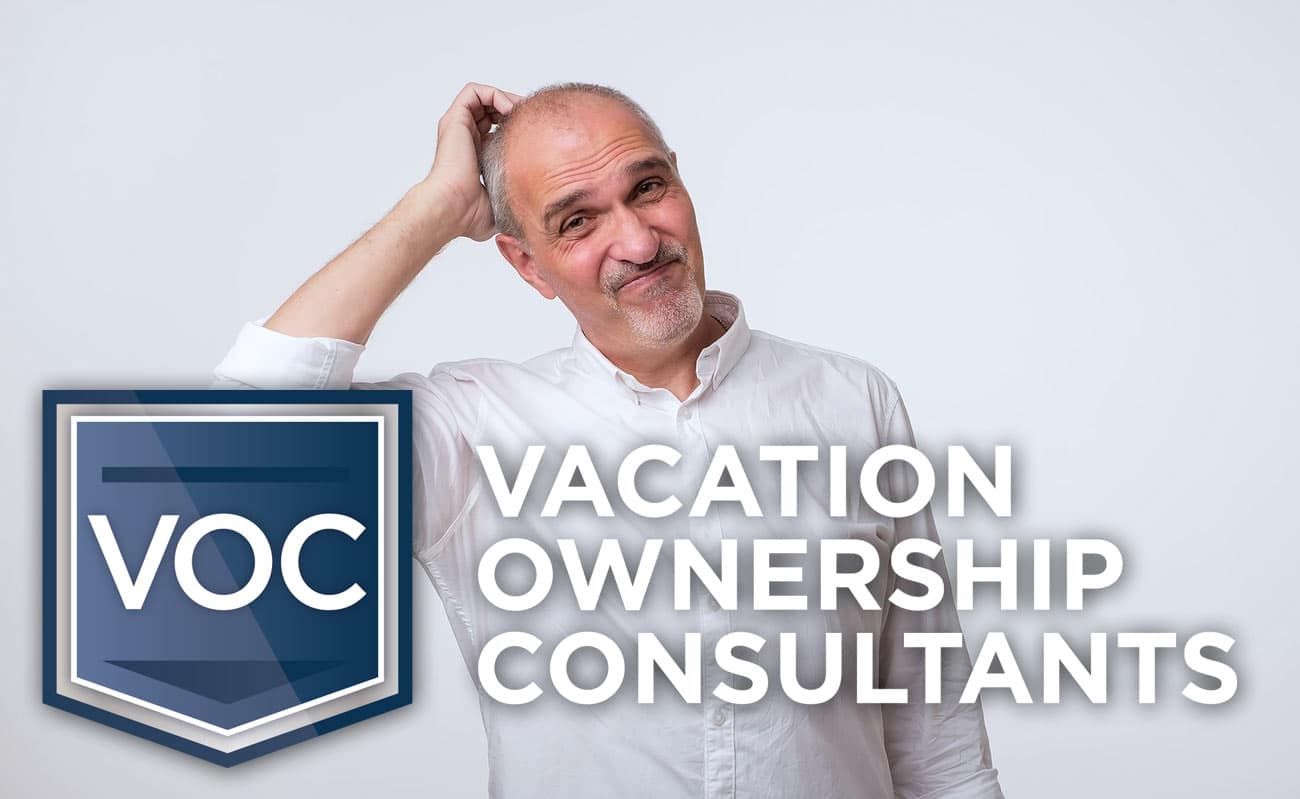When a vacation owner first realizes the timeshare resort isn’t eager to provide relief, a number of things go through their mind. While most are initially consumed by outrage, victimization or heavy remorse; desperation usually steers their desire to eliminate timeshare obligations. Because of this, many are deceived by a third-party solution, only to experience further turmoil. As a result, many buyers learn to live with and endure the timeshare burden.
Since the exit industry is so crowded (and sketchy at best), disgruntled buyers often turn their ears to longstanding organizations when some form of advice is given – even if the company has no business providing direction here. But does prominence always equate trust?
Informative Content Now Has a Shifted Focus.
In the past, businesses used to leverage creative measures and value-driven marketing to engage potential customers. Today, many are simply vying for your attention and leaning on persuasive tactics to close. Unfortunately, informative content (or published information) is often purposed to benefit businesses and not necessarily the customer.
This is because the more views a blog or webpage receives, the more opportunities there are to make money or bolster the brand. In other words, quantitative methods appear to be slowly replacing quality advice. Whether published tips are effective or not, advertisers will always pay for views. The simple fact that revenue-based partnerships are leveraged to mislead online users is frightening to say the least.

Is AARP Targeting Aging Timeshare Owners?
While our goal isn’t to challenge the ethics and motives of private entities, we do feel obligated to inform the public of potentially hazardous information. No matter how compelling an article may read or how trustworthy a company may seem, research and discernment is key – especially if you want to eliminate timeshare obligations.
With that being said, AARP recently published an article titled “3 proven ways to get out of a timeshare”. At first glance, it may seem like there’s light at the end of your tunnel. But just because your membership provides you with free roadside assistance, it doesn’t mean they can assist you with an onerous contract and perpetual obligations. So, let’s take a closer look at what they have to say.
Guest Writer Shares Experience of Exiting Her Timeshare.
The article starts off by sharing some background information on a guest author that’s been frustrated by a timeshare contract. Kim Seney (a recent retiree) has apparently been trying to help her mother escape an unused, 30-year-old timeshare agreement for quite some time now. But the purpose of her testimony remains unclear.
Inheriting a Timeshare is a Voluntary Action.
First and foremost, the article makes an absolute claim of “no, your kids won’t have to keep paying fees after you die”. This is poor and vague advice. It has been proven that many people have in fact inherited timeshare baggage and want to unload it. If you are concerned about inheriting a timeshare, you can seek the advice of an estate and probate attorney or effectively cancel the contract before its owner passes on.
Do They Really See A Way to Eliminate Timeshare Obligations?
From here, the article ironically pivots to the vilification of the cancellation industry. “Seney had done her research. She’d looked into selling [the timeshare] on eBay and donating it to charity, to no avail. The next step looked to be a timeshare exit company, but the cost was high.” They even quoted her saying, “I’m uncomfortable paying $10,000 to get out of this thing.”
The article also molds around the advice of a direct competitor to the timeshare exit industry. Some digging will help you find the insight ironically comes from a blog that is owned and operated by a family that focuses on the timeshare resale industry.
Additional Tips of Value Left on the Timeshare Table.
If the AARP was truly interested in helping people eliminate timeshare obligations, they would take the time to pause and explain how an exit strategy could be more cost effective than other options. However, the article seems to portray the entirety of the exit industry as the red headed step child without any factual information – from a resource with obvious ambitions to thrive in resale.
Far too many vacation owners are way too comfortable crossing their fingers and hoping for the best when it comes to getting rid of their agreements. In the end, some add thousands of dollars to their already financial crisis. Multiple attempts to resell the product has a tendency to magnify the issue rather than eliminate it altogether.
Checking with the Resort Requires Discipline.
Despite this miss, we’re glad they took the time to explain the importance of exhausting options with the resort directly. “When you call them up, don’t talk to just anyone. Ask specifically for the person who handles “deed-backs” or “surrenders”. Explain your situation in detail and see if you can find a solution,” they said.
One of the “experts” they referenced went on to say, “Almost all the major programs have some sort of deed-back program.” But it would have been nice to see them go into more detail about the endless requirements. Telling readers “The squeaky wheel gets the grease,” is not exactly clear guidance on navigating resort sales teams.

AARP TIP 1: Cease Payments.
The first tip AARP gives to eliminate timeshare obligations is to simply stop paying. The article goes on to explain how unpaid loan balances “will have an impact on your credit but “if you simply stop paying annual fees, it’s possible a company won’t report that to credit bureaus.” While this may work for someone like Kim, walking away from the contract without assistance can be extremely unreliable.
We’re not saying this because we want your business. A number of owners have hired us to help them eliminate timeshare obligations years after they thought they walked away from free and clear timeshares. Whether the loan balance is paid off or not, an owner’s credit can absolutely get hit when they default on any financial obligations. Maintenance fees, taxes, assessments and any other annual costs are included in this.
Timeshares Are Rarely Threatened by Owners.
Simply put, the AARP claim that stopped payments are “the push resorts need to allow you to surrender” is irresponsible advice. They don’t even attempt to help the reader understand what doing so could entail. Instead, they continued to double down on the unstable solution.
“Accepting a surrender often costs them less than foreclosing on the property,” another source explained. “The amount of money usually is not enough for the resort to bring suit [and] they typically will remarket the timeshare,” the purported expert says. While this may prove to be effective for those with a lot of leverage, timeshares have been known to take clients to small claims court over delinquent dues that are less than $1,000!
This negligent form of advice is essentially instructing an owner to roll the die and accept potential consequences that may further their financial obligation or hardship. Every timeshare has their own strategy. Some look at the immediate cost vs reward, but many consider the long term effects and prove to allocate more resources with the sole intent to make the owner suffer for backing out. But why? Could it be out of spite? Maybe – but a power play to scare owners from following suit makes more sense.
Upgrades Appeal to Buyers Who Can’t Eliminate Obligations.
According to the CEO of one of the largest publicly traded timeshare companies, some timeshares earn “50% of their revenue” from upselling their client base. If you listen to their interviews, you’ll see they openly speak about these things. So, it’s probably in their best interest to keep you under contract opposed to spending tens of thousands to acquire a new client – to fill the void you caused them.
What’s even more concerning is that there are multiple public records that cite many cases where timeshares have sued owners for non-payment. However, this article does not cite any of that information. Whether an owner owes $50K or $500, there is plenty of consequence that has resulted from ceasing payment while ill-equipped or ill-informed.
AARP TIP 2: Use the Resale Market.
The second form of advice the travel platform so graciously offers is the concept of resale. They actually make the claim that this is a “proven way” to eliminate timeshare obligations – even though the statement is followed by: “You’ll get little or no money” in return. While they claim there to be some hope “for a premium timeshare in a higher-end chain like Disney, Marriott or Hilton”, the ignorance of the idea is not worth entertaining (in our opinion).
There are a number of advanced scams that flood the resale industry. No matter what companies like AARP say, many owners are still swindled out of thousands of dollars this way. Professional con-artists thrive in the resale industry. New operations pop up every day. The story we published about an experienced real-estate agent explains how it can play out. In the end, he was taken to the cleaners for over $20K.
Does Selling Really Eliminate Timeshare Obligations?
Listing companies are not always “resale companies”. Many are nothing more than “biz ops” that sell useless “advertising space” to list a timeshare. Most owners don’t understand the difference between the word “list” and “sell” and they almost never pay for any type of guarantee to sell the property. Instead, they buy an endless supply of ad space that has little to no demand. If the interval doesn’t sell, they’re almost never entitled to a refund.

AARP TIP 3: Hire an Exit Firm to Help.
AARP closes out the article with quite the contradiction. It reads, “Pretty much the only reason to even consider the exit company route is if you absolutely can’t bear to deal with the timeshare company yourself, and you’re willing to pay a lot.” This can be misleading as it may cause the “resale route” to seem like a more effective way to eliminate timeshare obligations.
Sadly, many owners often go through 2-3 failed resale companies (at $3K a pop) on average ($9K+ in total), before seeking the assistance of the exit industry. By the time they speak to someone like us, their skepticism is usually at an all time high.
AARP continues by giving them good reason. “Prices vary widely, around $4,500 is common.” This is an interesting remark considering the fact their guest writer’s opening comments purported a $10K ballpark figure for cancellation services. So which amount should owners expect? Do disgruntled buyers consider these types of services or should they avoid them at all costs?
If anything, the published statements create more confusion. Despite an urge for caution, AARP doesn’t explain how readers can identify fraud as it relates to any of their suggested “proven ways to get out of a timeshare”. It is a well-known fact that fraudulent practices exist in all of their suggested methods.
This Tip for Vacation Owners Is Confusing.
If AARP thinks a third party exit plan does more bad than good, why do they consider it a “proven solution”? Despite their vagueness, AARP goes on to claim the biggest red flag for relief is up-front fees. They also explain the importance of thoroughly researching the company. But who they reference is rather astonishing. “If they’ve been in business long enough, they’ve had complaints,” it read.
Ironically enough, the quote came from the owner of an exit firm with a plethora of complaints. They’ve actually been under some fire for recent court filings due to false advertising accusations. We were unable to find justification in the article as to why AARP used this source to advise desperate timeshare owners.
Is this really a proven way to eliminate timeshare obligations? After reading between the lines, do you think their goal is to provide ample tips for vacation owners? We’ll let you come to your own conclusion.

Bias Doesn’t Help Owners Eliminate Timeshare Options.
One of the biggest disappointments about articles like this is they almost always shy away from informing people that there are valid termination firms available. The same is true for selling with legitimate resale brokers or dealing with the timeshare to deed back their interest. The problem is that a majority of owners fall victim to scams, false promises or simply don’t qualify for help. There doesn’t appear to be much research or investigation supporting this article’s claims and it appears to have an agenda of its own.
One might think it has something to do with on-site advertising revenue– but who knows. The point is, consumers have to be willing to fact check publications despite the prominence of the platform. Although limited, there are effective resources that can truly assist with eliminating timeshare obligations. It would have been refreshing to see better content from a company that focuses on an elderly audience (that’s more susceptible to scams in their golden years).
Unhappy Buyers Don’t Have to Keep Guessing.
We recently had an inquiry that was very upset about the timeshare he inherited from his parents. After he stopped making payments, the timeshare demanded them. As he went about it alone, his credit dropped about 80 points and he found himself struggling to qualify for a new home loan. He needed help and we were able to point him in the right direction with effective results.
AARP is right about one thing: You’re not alone in your fight. According to ARDA, nearly “10 million households own some sort of timeshare”. What’s even more ironic is that ARDA reports 85% of them want to sell them within 2 years. By the way, this was before the pandemic. If so many people were already dissatisfied with a product that’s difficult to escape, why aren’t platforms like these taking a bigger stand?
Is AARP Providing Thorough Guidance?
Hundreds of thousands of aging consumers count on entities like AARP to help them navigate things they don’t understand. Since many are already ravished with fear, they deserve to know more about the devastation of the product in general. Telling readers “management fees continue for as long as you own the property, whether you use it or not,” requires further explanation. This statement may actually not be true depending on how their agreement reads.
Some resorts only require an owner to pay maintenance fees upon usage. Most of these are international but some do have a stateside presence. Unfortunately, AARP appears to be more interested in their return. If not, they wouldn’t publish advice from a resource with a possible agenda to make money by connecting unhappy owners with certain resellers.
In other words, you have to ask yourself: is AARP’s advice bought or do they actually know how to eliminate timeshare obligations? Only time will tell but it’s something worth keeping an eye on.








One Response
My time share with the mortgage was given to credit card company and I was told I have to pay the credit card company off, so I am stuck.